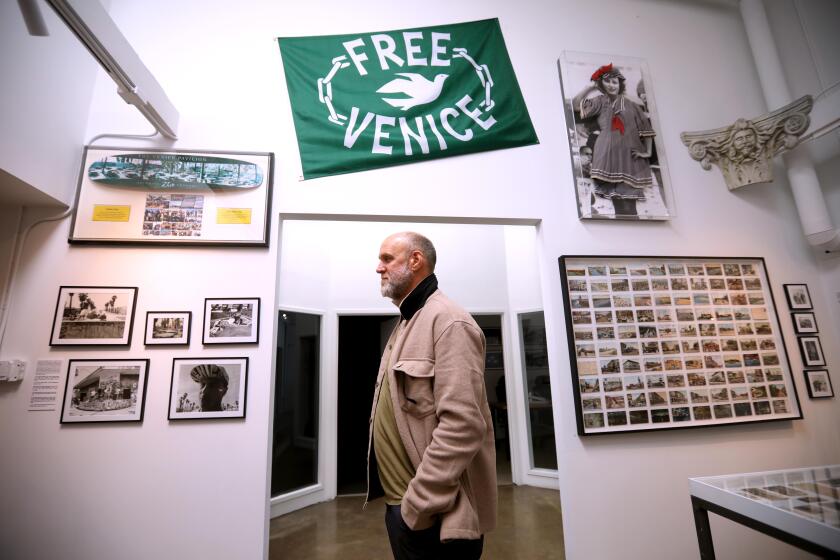Police Pedestal No Longer Intact : Crime: Recent transgressions by law officers have damaged a special kind of trust. More openness is the key to restoring confidence.
When the flashing lights of a police car appeared in my rearview mirror on Mission Gorge Road late one Sunday night a couple of years ago, for just a second the murder conviction of California Highway Patrol Officer Craig Peyer came to mind. Was it safe to stop, to roll down the window?
When I was pulled over last year for an illegal U-turn in Pacific Beach at 3 a.m., apprehension competed with the irritation of getting caught. I kept my hands firmly on the steering wheel. I didn’t reach for my purse or the glove compartment. I didn’t want to do anything that might be perceived as a furtive move, anything that might prompt the officer to draw her gun.
Officers had killed a number of people in recent months. Some in pretty questionable circumstances. What kind of stress had this officer been under? (I was relieved it was a woman. None of the officers involved in shootings had been women.)
Like most people, I rarely have contact with police. Four or five traffic stops in 27 years of driving. My home was burglarized once. And, except during anti-war protests in the 1960s, I have never been afraid of cops. Even during demonstrations, the tacit understanding was that I would have had nothing to fear if I weren’t demonstrating.
Sure, I knew there were corrupt cops, I knew there were racist cops. I didn’t believe black and brown people were always treated as fairly. But as a white, middle-class female with no criminal record, I didn’t worry about being harmed. I had a gut-level trust.
Most blind trust is left behind in childhood. Gradually, we learn to check out even the people whom society traditionally puts on pedestals--doctors, teachers, ministers--by asking friends, by interviewing, by listening to them in the pulpit or classroom.
We also have a choice on how much to trust them.
Police officers, though, fall into a different category. We want to trust them. That trust gives at least an illusion of protection from harm. Besides, caveat emptor is not an option with police services. Law enforcement, especially in crises, where most of us meet cops, works on the basis of presumed trust in the institution.
Criminal accusations against police in recent years, and several this summer, have made that trust less automatic. Rambo squads. Fatal shootings. The Rodney King video. Robbery. A deputy who fondled the breasts of a motorist he stopped. Rape charges against one deputy, and now a San Diego police officer named as the prime suspect in a string of rapes and robberies.
I still know that the vast majority of police officers are trustworthy. But the cumulative effect of this lawlessness is hesitation when I see an officer. A hesitation I didn’t used to feel, and I don’t want to feel.
And I am not alone.
When a friend’s home was recently burglarized, an officer went through the house with her to document what had been taken. As they went over her possessions, she found herself thinking about Sheriff’s Deputy Michael Stanewich, who was killed while robbing a house this summer. The thought was vague. Rationally, she knew she did not have anything a police officer would want to come back and steal (as Stanewich had done).
But there was that moment of doubt.
Another friend related a conversation he had with a Chula Vista couple who travel to Baja frequently. They acknowledged the necessity of bribing some Mexican police officers to stay out of trouble. But at least the rules of the engagement are known in Mexico, they said. In the United States, they are less clear. Here, the penalty for violating the “rules” could be fatal.
A colleague, who calls himself a right-wing, law-and-order conservative, complained of police abuse of power. He can’t believe he is saying such things.
A friend found himself re-examining the burglary of his home several years ago. There were unanswered questions about how the police handled the case. Now he wonders whether a cop might have been involved.
There are the widespread wisecracks and black humor about the likelihood of being a victim of the police. And, in a recent Times Poll, 10% of the respondents said they feel uneasy about their safety when they see police.
I fall into that 10%, and I don’t like it.
That doesn’t mean I presume police officers are lawbreakers. In fact, I was appalled to find that more than a third of the people polled believe unlawful conduct by officers or deputies is common.
I believe that most police officers are law-abiding and dedicated to upholding the law. I admire their courage and would not want to face their dangers. Nor would I like to deal with the dark side of life as often as they do.
I also know they are human beings, and that some have deep character defects or personal problems that affect their job performance. But I thought internal safeguards could weed out officers who would murder, rape or rob, even if they could not eliminate corruption.
Some of my uneasiness may pass when this spate of incidents ends. I hope so, but I doubt it.
The pedestal is cracked, and I can’t repair it by becoming a smarter consumer. I cannot comparison shop for a cop as I can for a doctor. I can’t ask for credentials or training academy grades, or check references on the cop who pulls me over for speeding or the officer who responds to an emergency.
The cracks in the pedestal require structural repair. I want to know not only that officers-turned-criminals will be prosecuted, but also what steps are being taken today to prevent the Michael Stanewiches and Craig Peyers of tomorrow. Assurances from the top of thorough internal-affairs investigations and background checks won’t suffice. They’re too private.
More openness about disciplinary decisions and evaluations of officers’ performance is the key to improving public confidence. It’s the only solid substitute for the direct experience or word-of-mouth referrals we use to judge other people we entrust with our welfare.
And support for this openness needs to come from rank-and-file officers, instead of having them close ranks against change. I want to know that officers care more about the reputation of good police officers than about shielding buddies with problems.
New safeguards may also be necessary. But if I can’t see the checks and balances at work, they are of little help.
Blind trust in officers has gone on the shelf with blind trust in other institutions. But the flicker of fear when I’m confronted by law enforcement might be extinguishable. And I sure don’t want it to grow.
More to Read
Start your day right
Sign up for Essential California for news, features and recommendations from the L.A. Times and beyond in your inbox six days a week.
You may occasionally receive promotional content from the Los Angeles Times.






